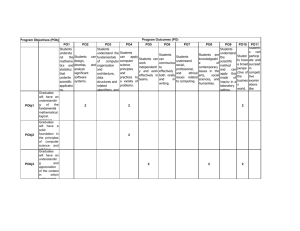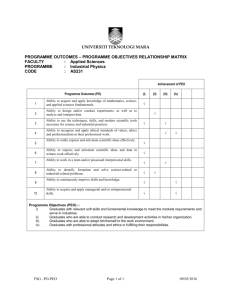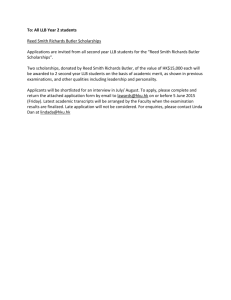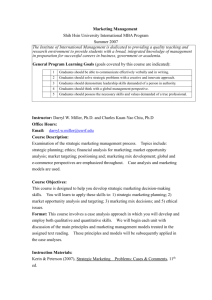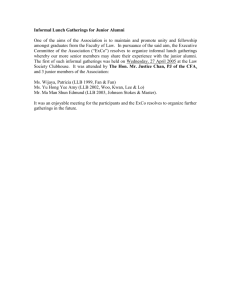Document 10464704
advertisement
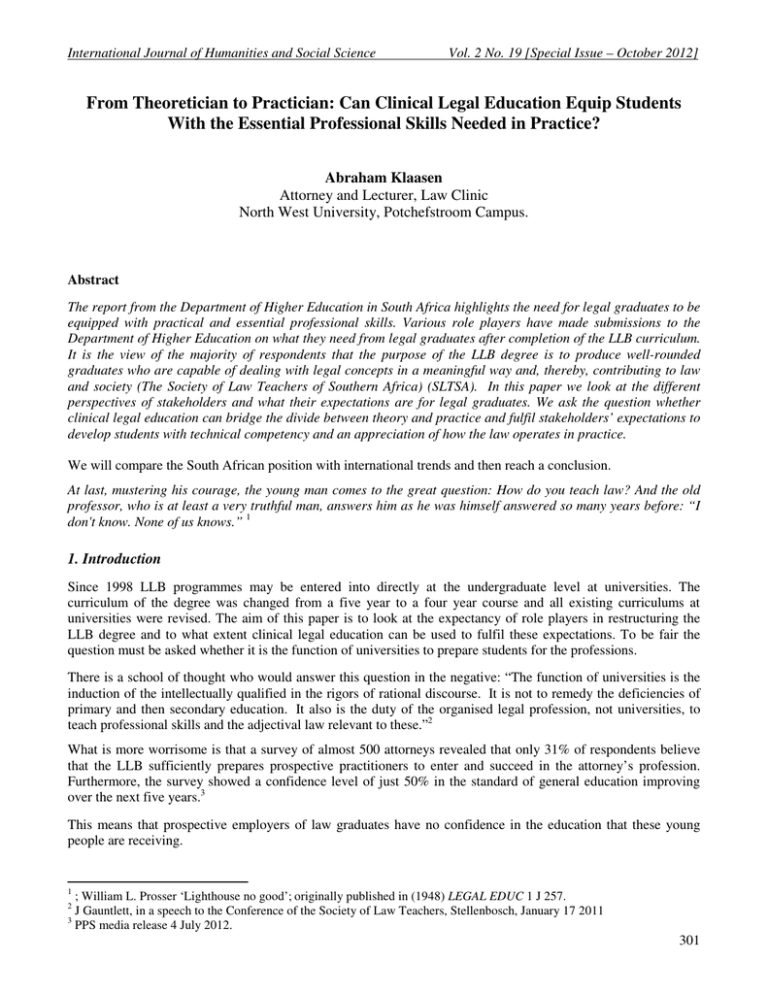
International Journal of Humanities and Social Science Vol. 2 No. 19 [Special Issue – October 2012] From Theoretician to Practician: Can Clinical Legal Education Equip Students With the Essential Professional Skills Needed in Practice? Abraham Klaasen Attorney and Lecturer, Law Clinic North West University, Potchefstroom Campus. Abstract The report from the Department of Higher Education in South Africa highlights the need for legal graduates to be equipped with practical and essential professional skills. Various role players have made submissions to the Department of Higher Education on what they need from legal graduates after completion of the LLB curriculum. It is the view of the majority of respondents that the purpose of the LLB degree is to produce well-rounded graduates who are capable of dealing with legal concepts in a meaningful way and, thereby, contributing to law and society (The Society of Law Teachers of Southern Africa) (SLTSA). In this paper we look at the different perspectives of stakeholders and what their expectations are for legal graduates. We ask the question whether clinical legal education can bridge the divide between theory and practice and fulfil stakeholders’ expectations to develop students with technical competency and an appreciation of how the law operates in practice. We will compare the South African position with international trends and then reach a conclusion. At last, mustering his courage, the young man comes to the great question: How do you teach law? And the old professor, who is at least a very truthful man, answers him as he was himself answered so many years before: “I don't know. None of us knows.” 1 1. Introduction Since 1998 LLB programmes may be entered into directly at the undergraduate level at universities. The curriculum of the degree was changed from a five year to a four year course and all existing curriculums at universities were revised. The aim of this paper is to look at the expectancy of role players in restructuring the LLB degree and to what extent clinical legal education can be used to fulfil these expectations. To be fair the question must be asked whether it is the function of universities to prepare students for the professions. There is a school of thought who would answer this question in the negative: “The function of universities is the induction of the intellectually qualified in the rigors of rational discourse. It is not to remedy the deficiencies of primary and then secondary education. It also is the duty of the organised legal profession, not universities, to teach professional skills and the adjectival law relevant to these.”2 What is more worrisome is that a survey of almost 500 attorneys revealed that only 31% of respondents believe that the LLB sufficiently prepares prospective practitioners to enter and succeed in the attorney’s profession. Furthermore, the survey showed a confidence level of just 50% in the standard of general education improving over the next five years.3 This means that prospective employers of law graduates have no confidence in the education that these young people are receiving. 1 ; William L. Prosser ‘Lighthouse no good’; originally published in (1948) LEGAL EDUC 1 J 257. J Gauntlett, in a speech to the Conference of the Society of Law Teachers, Stellenbosch, January 17 2011 3 PPS media release 4 July 2012. 2 301 The Special Issue on Business and Social Science © Centre for Promoting Ideas, USA www.ijhssnet.com 2. Council on Higher Education The Council on Higher Education distributed two electronic surveys, one for university law lecturers and one for legal practitioners (advocates, attorneys, judicial officers, prosecutors, legal advisers in the public and private sectors) in March 2010. The aim of the surveys was to undertake research into the effectiveness of the LLB degree curriculum in South Africa. Interested parties were asked to address issues as outlined below. Submissions were received from different groups. Meanwhile Council for Higher Education chief executive Ahmed Essop4 explained that a possible national review, which is being discussed with the SA Law Deans' Association, would be undertaken by academics. The mooted national review is motivated by 'continued worry about the quality of the LLB in general' and unsatisfactory results in former polls by the council. The CHE will then assess the LLB courses of each institution to measure compliance with those minimum standards. If some degree offerings are found not to be in compliance, the council will give a deadline for compliance to those institutions or, in extreme cases, scrap those courses, Essop said. Mr Essop further explained that opinions of professional organisations on the requirements needed by graduates would not necessarily be taken into account in such a review. In my view it is of the utmost importance that universities should take the proposals by the organised professions very seriously. We will take a closer look at these submissions and comment on some of them. 3. Main purpose of the LLB degree From the outset it is clear that stakeholders differ in what they perceive the purpose of the LLB degree should be. The Department of Defence’s Legal Service Division5 submits that the main purpose of this degree is to furnish a platform of academic knowledge and practical skills. The only remaining task for the employer should be to expose the graduate to unique in-house intricacies. IAASA6 the questions whether universities should cater for the full education, as is the case in medical studies where, if you receive your degree, you can go into practice. They submitted that if that was the aim, universities failed as student’s still lack practical expertise when they join the bar. This is not an easy question to answer. LLB graduates wishing to practice law usually complete their pupillage and write the bar exams or do articles and write the attorneys admission exams. There are however students who chose to apply to be admitted as advocates without joining the bar and who go into practice armed only with a LLB degree. There is an oversupply of attorneys in South Africa and the market cannot absorb the number of law graduates.7 Students’ battle to register for articles and if they complete articles to find work as attorneys. The balance of graduates need to either change careers or become internal legal advisers, take up positions as compliance officers or company secretaries. Universities should thus strife to provide their graduates with an edge over competitors in the job market. I strongly believe this edge can be achieved in equipping graduates with practical skills necessary to enter legal practice. The NPA8 submits that the purpose for the LLB programme should be to provide graduates with substantial indepth knowledge and understanding of the principles, concepts, values and substantive rules of the South African legal system, and with the main legal institutions and procedures of the South African legal system. They further submit that it is necessary to provide graduates with the skills and abilities necessary to practice law either in the public or private sector. According to SALDA9 the LLB program provides basic learning in law, foundational to various law-related professions. The law deans however, do not define the concept of basic learning in law. 4 ‘Graad in regte dalk hersien’ Beeld 9 July 2012. Submission dated May 2010 6 Independent Association of Advocates of South Africa in their submission dated 12 May 2010 7 Dewar D, (June 2011) ‘Too many attorneys? Oversubscription to the attorneys’ profession.’ De Rebus Butterworths. 8 National Prosecuting Authority of South Africa in undated submission 9 South African Law Deans’ Association submission dated 9 April 2010 5 302 International Journal of Humanities and Social Science Vol. 2 No. 19 [Special Issue – October 2012] SLTSA10 is of the view that the purpose of the LLB degree is to produce well-rounded graduates who are capable of dealing with legal concepts in a meaningful way and, thereby, contributing to law and society. Well-rounded is defined11 as wide and varied. Do they mean producing students with a good theoretical knowledge of the law and the necessary skills to apply this knowledge to boot? Their next statement would seem that this was not their intention: It is a fact that there are many law graduates that have risen to the top positions in various non-legal fields including careers as diplomats, politicians, management consultants and business executives.1213 Raising the question should universities offer more choices of subjects in their curriculum? Specialised career paths with a legal degree as the basis could be offered to students. Varsity College14 states that the main purpose of the LLB programme is to equip law students to think critically; to have developed their legal research skills and to have a sound knowledge of the South African legal system. The ability to think critically and to have well developed research ability is unfortunately not the only skills the graduate is going to need when entering practice. I don’t know of any universally accepted list of skills needed by legal practitioners. In my view legal graduates should have mastered at least the following: consultation skills, file and case management, numeracy skills, practice management, legal research and writing the writing of opinions, drafting skills and trial advocacy.15 I would also include professional and ethical conduct as a skill desperately needed by any young graduate entering the workplace. 4. Knowledge, skills and abilities required of LLB graduates At first glance stakeholders disagree on what knowledge, skills and abilities are required of LLB graduates however if one looks closer it seems that they are not that far apart from each other. Hereunder follow a few of the submissions received. In the field of criminal law, the graduates should have sufficient knowledge to assess routine dockets and the evidence contained therein in terms of relevance and admissibility of evidence, identification of suspects, offences and specific elements of offences16. It would seem that what is insisted on here is the ability of graduates to think critically, analyse the facts and come to a conclusion while giving effect to criminal law and the rules of the law of evidence. Is this not something we are teaching our students already? The LSSA insists on adequate skills training and vocation-directed language training.17 I would agree that language is a legal practitioner’s most important tool and should form part of any law school’s curriculum. Law graduates must have developed a sound understanding of:18 • Legal ethics • Constitutionalism; • Social context in which attorneys practise; • Principles of management (business literacy). I agree with the first two bullets of the submission; legal ethics and constitutionalism should form part of the curriculum for any law degree. With regard to the social context in which attorneys practice I find that getting a practising lawyer to address the students in a Legal Practice class and answering their questions gives them a sound understanding of the attorneys profession and what they could look forward to when entering it. 10 Society of Law Teachers of Southern Africa Oxford Advanced Dictionary of Current English 1992, 4th Edition, Oxford University Press. 12 IM Hoffmann Lewis and Kyrou’s Handy Hints on Legal Practice (2011) 2nd South African edition, LexisNexis 365. 13 It is seen by many that the law degree has replaced the arts degree as the generalist degree which provides for a large range of career opportunities; lawyers have increasingly embraced the diverse job opportunities that have become available to them. Hoffmann (n12 above). 14 Ongedateerde submissie gemaak deur Fiona Kaplan, Nasionale Program Bestuurder: LLB, Varsity College. 15 See De Klerk et al Clinical Law in South Africa 2006 Second Edition LexisNexis. The learned authors do not refer to this as a list of needed skills but set it out as chapters in the publication. 16 Defence legal Services Division 17 Law Society of South Africa. 18 Law Society continues. 11 303 The Special Issue on Business and Social Science © Centre for Promoting Ideas, USA www.ijhssnet.com Arrangements are also made that the students are addressed by a state prosecutor and an advocate who is a member of the bar. I doubt whether all prospective LLB graduates would want or need to have a sound understanding of business management. I would suggest that law faculties offer a business management program that can be taken by students who intend to manage their own law practice or join the business environment. According to the NPA the LLB programme should equip graduates with at least the following skills and abilities: • Communication skills, jurists interact with a large variety of people; therefore they must demonstrate excellent communication skills (oral and writing); • Observational skills, jurists spend a lot of time in court observing witnesses, reading case materials etc. which requires keen attention to detail; and • Analytical skills, jurists must have probing analytical skills in order to develop their arguments. • Memorisation skills, jurists must have a working knowledge of common law, case law, statutory law etc. All the above mentioned skills by the National Prosecuting Authority should form part of the outcomes of the LLB program at any law faculty in South Africa. The question must be asked whether the program outcomes should be revisited to determine if they are being reached. LLB graduates should have knowledge of the key disciplines of South African law as a distinct field of learning, including the essentials of the history, sources and practical operation of the law.19 They should also have those skills associated with the effective articulation and communication of legal solutions to problems governed by law. These include advanced language skills (oral and written), analytical skills and an understanding of the prevailing social and legal culture, and the ability to keep abreast of new developments in law, to research the sources of law effectively and to develop new and specialized expertise in one or more discipline of the law independently. 20 The Society of Law Teachers of Southern Africa wants graduates to be capable of engaging with a variety of legal materials (statutes, case reports, textbooks, journal articles, legal documents, etc) in a meaningful way. They must be able to read, understand, analyse critically and apply the contents of these materials in an appropriate manner. Graduates are required to master an extensive body of legal knowledge across a broad spectrum of legal disciplines. Graduates must develop an understanding of the historical and jurisprudential underpinnings of the law in order to fully comprehend the operation of the legal system. The development of oral and written communication skills is essential since language is of paramount importance. They must learn how to identify legal problems and issues, to consider and analyse them critically and to think innovatively around possible solutions that are socially and culturally sensitive. Research skills are essential for law graduates both for ensuring their knowledge remains current and in developing solutions to legal problems. Numeracy skills are also essential. As stated by the Society of Law Teachers of Southern Africa it is vital that law graduates are able to communicate effectively both verbally but especially, their written skills should be sufficient to allow them to draft legal documents and papers with ease. Furthermore LLB graduates should have attained research skills as this is imperative for those who choose to practice law, in whatever field they choose to specialize. 21 Looking at all the submissions it is clear that they are not that far apart. Language, research and analytical skills are deemed important in all the submissions. Some of the stakeholders call for skills particular to their environment. Does the ability to analyse a docket, research the relevant law and apply it to the facts in any way differ from the instance where students analyse a court case? The same skills are applicable to the different circumstances. The skills required are essentially the same, only the process and the theory may change. 5. To what extent does the LLB programme permit the acquisition of the required knowledge and skills? The Department of Defence Legal Services argue that a greater focus on practical application is definitely required to imprint certain skills. 19 South African Law Deans Association South African Law Deans Association 21 Varsity College 20 304 International Journal of Humanities and Social Science Vol. 2 No. 19 [Special Issue – October 2012] They stress that consultation skills with clients in all manner of cases are lacking. The absence of Latin from curricula is lamented on the grounds that legal practitioners should understand all Latin phrases contained in legal documents. They also require that the standard of the examination be raised.22 It is premature to require that the standard of examination must be raised due to the fact that there is not enough information available at this stage to blame the dissatisfaction with the LLB degree on the level or standard of examination. The NPA states that the current LLB programme is academic in nature in that it only concentrates on “knowledge of the law” and neither on the acquirement nor enhancement of the other vital skills and abilities. The statement by the NPA is not true; most law faculties offer Legal Practice as either compulsory or choice subject. This program is usually presented by the Law Clinics. It is important to look at the number of students being reached. If it is not a compulsory program, what would the skills development of the students not taking the program be? How are they acquiring the skills to needed in practice? Is it really enough to set loose a few brightly polished diamonds each year? SALDA blames the lack of knowledge, skills and abilities of graduates on the under-preparedness of university entrants and poor lecturer / student ratios in most institutions. Most if not all academics would to some extent agree with this statement. But if SALDA acknowledges that there is a lack of knowledge, skills and abilities amongst graduates, why are these students graduating? Does this validate the call by the DOD to raise examination standards? SLTSA argues that the 4 year LLB program is facilitating acquisition of these skills. The extend of its success however, differs from institution to institution and is subject to a number of factors including available resources, financial and human, calibre of students entering the program and the size of classes. The acquisitions of skills needed in practice are possible with the LLB program, Faculties should align the subject matter of the traditional courses like the procedure subjects and the law of evidence with a practical law program. Students could receive the theoretical foundation in law and at the same time the practical application of these same principles. Varsity College submits that the LLB programme does not adequately equip graduates with the requisite knowledge, skills and abilities necessary to practice as a capable legal practitioner. Law graduates are ill-equipped to offer the best professional advice to members of the public. The LLB program is not adequate in providing students with the skills and knowledge to practice law properly. Because of basic numeracy and literacy skills law graduates commit errors. Law practitioners do need quite advanced numeracy skills. But is it the responsibility of Universities to teach this to students under the banner of a LLB program? 6. Challenges and difficulties facing universities.23 Most of the submissions by the stakeholders raise the issue of being faced with students who are under-prepared for tertiary education24. Reasons for this are given as inadequate literacy and oral skills as well as inadequate critical reading and writing skills of school-leavers. Poor numeracy skills and a lack of general knowledge contribute to the students not being able to cope with the LLB programme and the field of law in general. The attitude and discipline of students are also raised as a point of concern.25 The NPA give the example of aspirant prosecutors who are ignorant of basic legal terminology: “Some indicated that they have never heard of ‘dolus directus, dolus eventualis, novus actus interveniens or non pathological incapacity.’” These aspirant prosecutors claimed that they have never been taught or lectured to on these topics at university. 22 The NPA also attacks examination standards by Universities in their submission under the paragraph of challenges and difficulties facing universities. 23 The submissions under the heading Challenges and difficulties facing students won’t be discussed here as it mostly correlates with the submissions received under the heading discussed in this paragraph. 24 The following stakeholders listed the fact that students are underprepared for tertiary education: Varsity College, DOD, SLTSA, SALDA, LSSA and NPA. 25 The NPA stated that students have the general attitude problem of ‘I am here – it is your responsibility to keep me entertained and to make sure I successfully complete my studies.’ 305 The Special Issue on Business and Social Science © Centre for Promoting Ideas, USA www.ijhssnet.com The NPA raises the valid point that this reflects on the quality of lecturing and the difference in standards at universities.26 Although this is a genuine concern the question must ask whether it is possible for a law student never to be lectured on these basic legal principles in their years of study at university. 7. National Qualifications Framework The National Qualifications Framework (NQF) of South Africa has been introduced to create an integrated framework for learning achievements which will facilitate access to, and progress within, education and training. Levels five to eight of the NQF deals with higher education and training. Law falls under field eight of the organising fields. The South African Qualifications Authority27 also identifies seven critical outcomes that must achieved by any SAQA registered qualification. It further sets five developmental outcomes that must be complied with. For purpose of this discussion only the following critical outcomes will be highlighted: • • • • • • Identifying and solving problems in which responses display that responsible decisions using critical and creative thinking have been made; Working effectively with others as a member of a team, group organisation or community; Organising and managing oneself and one’s activities responsibly and effectively; Collecting, analysing, organising and critically evaluating information; Communicating effectively using visual, mathematical and/or language skills in the modes of oral and/or written persuasion; Demonstrating an understanding of the world as a set of related systems by recognising that problemsolving context do not exist in isolation. The abovementioned along with the Higher Education Act28 means that an outcome based education system must be followed by all educational institutions. Universities cannot ignore the fact that skills must be instilled in students for all qualifications, including law. “Legal education and training are essential to the role that law faculties play in the transformation of South African society. A human- rights culture requires effective legal services. Legal skills are required in all areas from the para-legal to the public sector, hence; legal curricula should be designed to make those with legal training as effective as possible as early as possible in their careers. The scarcity of articles available to candidate attorneys frustrates this purpose and has occasioned a need for universities to move from offering purely academic training to adopting a more integrated approach. This does not mean that universities should become technical colleges, but, that they should attempt to meet social needs and to be increasingly relevant.”29 8. International trends The questions regarding the effectiveness of law degrees are also debated in other countries. In response to years of complaints that law schools failed to prepare students to practice law, several prominent and respected authorities on legal education, including the Carnegie Foundation for the Advancement of Teaching, recently have proposed significant curricular and pedagogical changes in order to bring American legal education into the twenty-first century- indeed, some would say simply into the twentieth century.30 The proposed reform primarily calls for more real-world and skills training and more effective teaching practices.31 26 The NPA also questions the ability of lecturers to teach law. The South African Qualifications Authority (SAQA) is a statutory body, established in terms of the SAQA Act, No. 58 of 1995. It is made up of 29 members appointed by the Minister of Education in consultation with the Minister of Labour. SAQA is mandated by legislation to oversee the development and implementation of the National Qualifications Framework (NQF). 28 Act 101 of 1997. 29 Dr CMA Nicholson ‘A new LLB for a new South Africa.’ MyUnisa; undated 30 Brent E. Newton ‘Preaching what they don’t practice: Why law faculties’ preoccupation with impractical scholarship and devaluation of practical competence obstruct reform in the legal academy.’ South Carolina Law Review Vol. 62: 105 31 William M. Sullivan et al ‘Educating Lawyers: Preparation for the profession of Law’ (2007) Jossey-Bass 27 306 International Journal of Humanities and Social Science Vol. 2 No. 19 [Special Issue – October 2012] The Carnegie Report regards legal education as an apprenticeship of the mind where students start on the road towards assuming the identity of competent and dedicated professionals.32 The Report identifies three aspects of this apprenticeship: • • • Intellectual—focusing on formal knowledge and analytical reasoning; Skills used by competent practitioners; and Professional values and ethics. In dealing with the quandary about the vocational/academic purpose of legal education and in line with a similar concern in other European institutions33, a growing number of Irish law faculties have incorporated, or are planning to incorporate, more practice related components into the law curriculum and, in some cases a fully fledged Clinical Legal Education program.34 The teaching of legal practice is essential in turning the theoretician into a practician. It is essential, now more than ever that student be taught the basic legal skills. Students must be taught how to consult with clients, the drafting of documents, trial advocacy and problem solving to name but a few. It is essential that students are equipped with the professional skills to meet the demands of legal practice. They must develop research and analytical skills to translate their theoretical knowledge into persuasive and convincing arguments and must have an understanding of how the law operates in practice. Anton Elder von Gapp35 stated in 1828; ‘Ultimately, it has to be acknowledged that praxis needs theory as a necessary tool, but also that theory becomes useless, if it is not close to, or if it is disconnected from, praxis.’ Why should a student of law be denied the privilege that the students of the sciences enjoy, of learning at the outset of his study from treatises what other original investigators have discovered? The law student must learn to make the original investigation for himself, and to diagnose the principles of law from the cases of actual litigation. No reason can be given why he must learn the whole science of the law by his own investigations in the undigested mass of raw material in the shape of adjudicated cases. The instructors of the other sciences have not discarded the treatise; they have only supplemented the use of the treatise with the resort to the laboratory and operating room.36 9. Conclusion Why should the legal academy frown on the teaching of the practical application of law? Should we not equip our law students to the same extend that the students of the other sciences are being equipped for their entry into their respective fields? To that extent legal practice as taught at the Legal Clinics is the correct vehicle to turn the theoretician into practician and equip students with the skills required in practice. Universities in South Africa should beware that the legal qualifications they offer do not become irrelevant in the modern world and their students unemployable after graduation. 32 Sullivan (n31 above) 27–29 A Bucker and WA Woodruff (2008) ‘The Bologna Process and German Legal Education: Developing professional Competence through Clinical Experiences’ 9 German Law Journal 575. 34 M Paris and L Donnelly ‘Legal Education in Ireland: A Paradigm Shift to the Practical.’ German Law Journal Volume 11 No. 09 (1067) 35 Gapp, Anton Edler von (1828). ‘Erörtörung der Begriffe: redlicher — unredlicher Besitzer; — Rechtmäßiger — unrechtmäßiger; — echter — unechter Besitz; nach den Bestimmungen des öfter, allg. bürg. G. B.’. Oesterreichische Zeitschrift für Rechts- und Staatswissenschaft. 36 Steve Sheppard ‘The History of Legal Education in the United States’ (2007) Law Book Exchange Ltd, 876 - 878 33 307 The Special Issue on Business and Social Science © Centre for Promoting Ideas, USA www.ijhssnet.com References Bucker A and Woodruff WA, ‘The Bologna Process and German Legal Education: Developing Professional Competence through Clinical Experiences’ (2008), 9 German Law Journal 575. Dewar D, (June 2011) ‘Too many attorneys? Oversubscription to the attorneys’ profession.’ De Rebus Butterworths. Gapp, Anton Edler von (1828). ‘Erörtörung der Begriffe: redlicher — unredlicher Besitzer; — rechtmäßiger — unrechtmäßiger; — echter — unechter Besitz; nach den Bestimmungen des öfter, allg. bürg. G. B.’. Oesterreichische Zeitschrift für Rechts- und Staatswissenschaft (1, 2). Gauntlet J, in a speech to the Conference of the Society of Law Teachers, in Stellenbosch, 17 January 2011. Hoffmann IM Lewis and Kyrou’s Handy Hints on Legal Practice (2011) 2nd South African edition, LexisNexis 365. Newton Brent E, ‘Preaching what they don’t practice: Why law faculties’ preoccupation with impractical scholarship and devaluation of practical competence obstruct reform in the legal academy.’ South Carolina Law Review Vol. 62: 105. Nicholson CMA ‘A new LLB for a new South Africa.’, MyUnisa; undated. Paris M and Donnelly L ‘Legal Education in Ireland: A Paradigm Shift to the Practical” German Law Journal Volume 11 No. 09 (1067). Prosser William L. ‘Lighthouse no good’ (1948). 1 J. LEGAL EDUC. 257. Sheppard Steve ‘The History of Legal Education in the United States’ (2007) Law book Exchange Ltd, pages 876 - 878 Sullivan William M. ‘Educating Lawyers: Preparation for the profession of Law’ (2007) Jossey-Bass. 308



